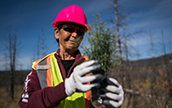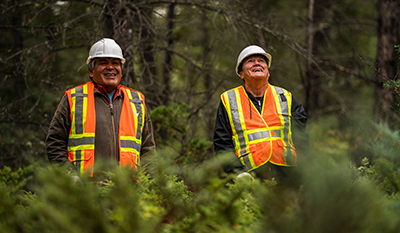Realising the role of nature
Powering progress
Our aim is to use nature-based solutions to mitigate emissions of around 120 million tonnes of CO2 per year by 2030.
Nature-based solutions (NBS) conserve, enhance and restore ecosystems – such as forests, grasslands and wetlands – to prevent greenhouse gases or reduce atmospheric CO2 levels. NBS provide benefits for people and the environment by preserving biodiversity, preventing floods, improving air quality and building more resilient and healthy communities.
Carbon credits generated from NBS projects can be used by Shell to compensate for our own emissions and to allow our customers to offset their emissions in line with the mitigation hierarchy of avoid, minimise and offset. As part of our selection criteria for NBS, we look for projects that will have a net positive impact for biodiversity and communities.
Carbon credits can also be generated by other types of projects, for example cookstoves. Better cooking facilities that displace open fires reduce carbon emissions, prevent local deforestation and improve air quality and therefore health.
In 2021, we aimed to invest around $100 million in nature-based solutions such as forests and wetlands that store carbon.
Projects may need different levels of funding at different stages of development. In 2021, investments were also affected by COVID-19, as site visits to potential projects were not possible. Establishing our new NBS team following a reorganisation also took some time. Nevertheless, in 2021, we allocated more than $480 million to various projects, to be deployed across the length of the contracts. More than 95% of this funding is for NBS projects. We deployed $37 million in 2021: $26 million for NBS and $11 million for cookstove projects and we retired around 6 million credits on behalf of our customers. These numbers exclude direct carbon trading activities.
In November 2021, Shell published its "Ensuring high-quality nature-based carbon credits" report that sets out our expectations and approach to quality across our NBS portfolio.
In 2021, we expanded our offer of carbon credits to drivers and business customers who wish to compensate for the life-cycle CO2-equivalent emissions generated by their use of the Shell fuel they buy. We have made this offer available to our fleet customers in 17 countries and to retail customers at more than 3,100 service stations in Austria, Canada, Germany, Hungary, the Netherlands, Switzerland and the UK.
Read more about nature-based solutions at www.shell.com/energy-and-innovation/new-energies/nature-based-solutions.









